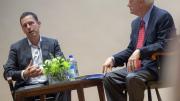In conversations about the economy, monopoly can often be a dirty word. But entrepreneur and venture capitalist Peter Thiel shared his far more iconoclastic view of the business world at an event at Harvard Business School (HBS) on Thursday, arguing that the best kinds of new ventures are monopolies—at least those that see untapped demands, introduce something brand-new to the world, create their own markets, and capture those new parts of the economy effectively.
In conversation with D’Arbeloff-M.B.A. Class of 1955 professor of business administration William A. Sahlman, Thiel—who is both a Paypal co-founder and early investor in Facebook, LinkedIn, Spotify, and Yelp—shared insights from his new book Zero to One: Notes on Startups, or How to Build the Future. He began by contrasting two businesses at opposite ends of the startup spectrum: a small restaurant, and Google. Restaurants face stiff competition because they try to draw in those who’d go to other eateries and those who’d rather eat at home. Google, on the other hand, has come to dominate the search-engine market and, as a result, has accumulated great capital. But it’s Google, not the closest pizza joint, that’s offered something meaningful to the world. “People think of capitalism and competition as synonyms, and I think they are really antonyms,” Thiel explained to a large crowd in HBS’s Burden Hall. “Monopolies are good when they create new things, bad when they become these sort of rent collectors. I think that as long as you have enough dynamism in the economy, they’re more good than bad.”
The event, hosted by HBS’s Arthur Rock Center for Entrepreneurship, showcased Thiel’s contrarian business philosophies while touching on a wide range of topics, from the future of Massive Open Online Courses to predictions of the next economic bubble. “There are many different business tropes I go against,” he explained. “We ascribe way too much to chance or luck….When you put too much emphasis on luck, you put way too little on the question of skill.” The best new businesses, he explained, are mission-oriented and have identified small markets they can easily dominate. He gave the example of Facebook, which created and took over the social-media market on the Harvard campus in the space of a few short days, and then repeated the process at dozens of colleges even before it made its way to Silicon Valley investors. “That’s an auspicious start,” Thiel reflected.
But he noted that, before he sat down with the Facebook founders in the summer of 2004, Boston-based investors had already turned the new company down, a signal of how the tech scenes have diverged in the two cities. Even as Thiel touched on Silicon Valley’s dominance, he warned that trying to apply the lessons of California to Cambridge would merely create a larger-scale version of the same problem of competition: “You don’t want to be the Silicon Valley of Boston.”
Thiel’s advice spoke directly to the hundreds of HBS students in the audience, whose hands shot up in huge numbers when the room was polled for those who planned to start their own businesses. He cited the example of a study of the industries that the largest cohorts of HBS graduates have entered historically—a study, it turns out, that his interlocutor Sahlman had written. Graduating students have flocked in droves to the wrong industries, Thiel explained, always trying to catch the last wave of a bubble that was about to burst: technology in 1999 and 2000, real estate from 2005 to 2007. Once again, they were trying to enter the competition, rather than trying to carve out new monopolies.
And when these ventures fail, the experience isn’t, for Thiel, the kind of learning opportunity that the old adage suggests. “The value of failure is greatly overrated,” Thiel said, explaining that the reasons for failure are often too complicated to create applicable lessons. Instead, “the lessons people draw from most failed startups is that it’s impossible to build great businesses, so you then try something less ambitious, which is one of the other ways failure has a high cost…. The belief that it is hard but possible to build up a great business is an extremely effective tool.”








